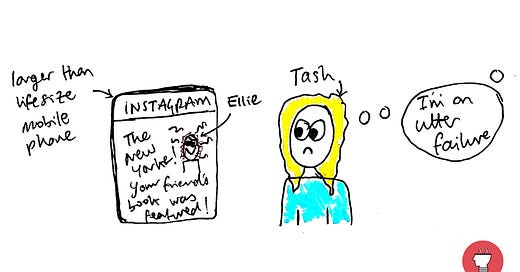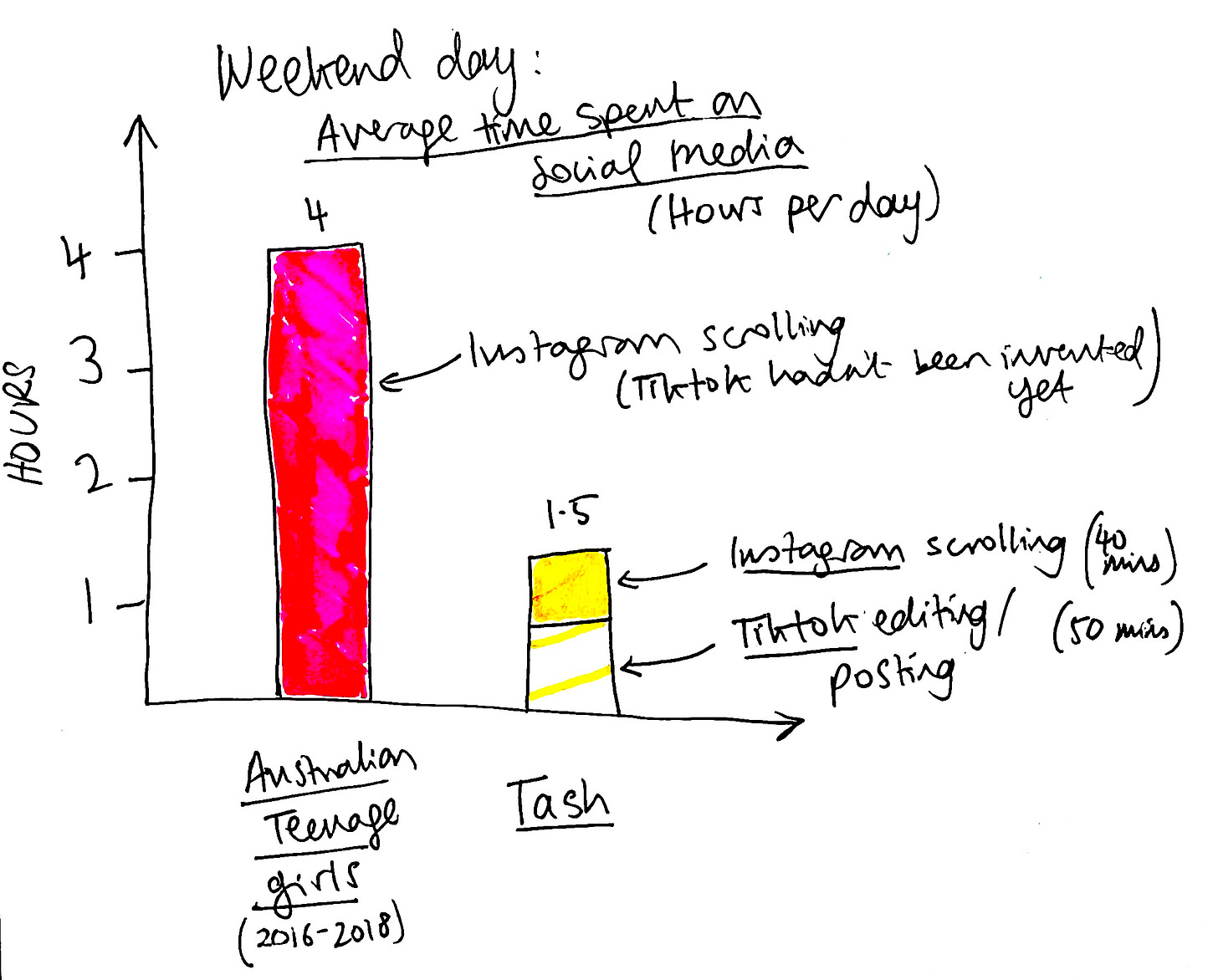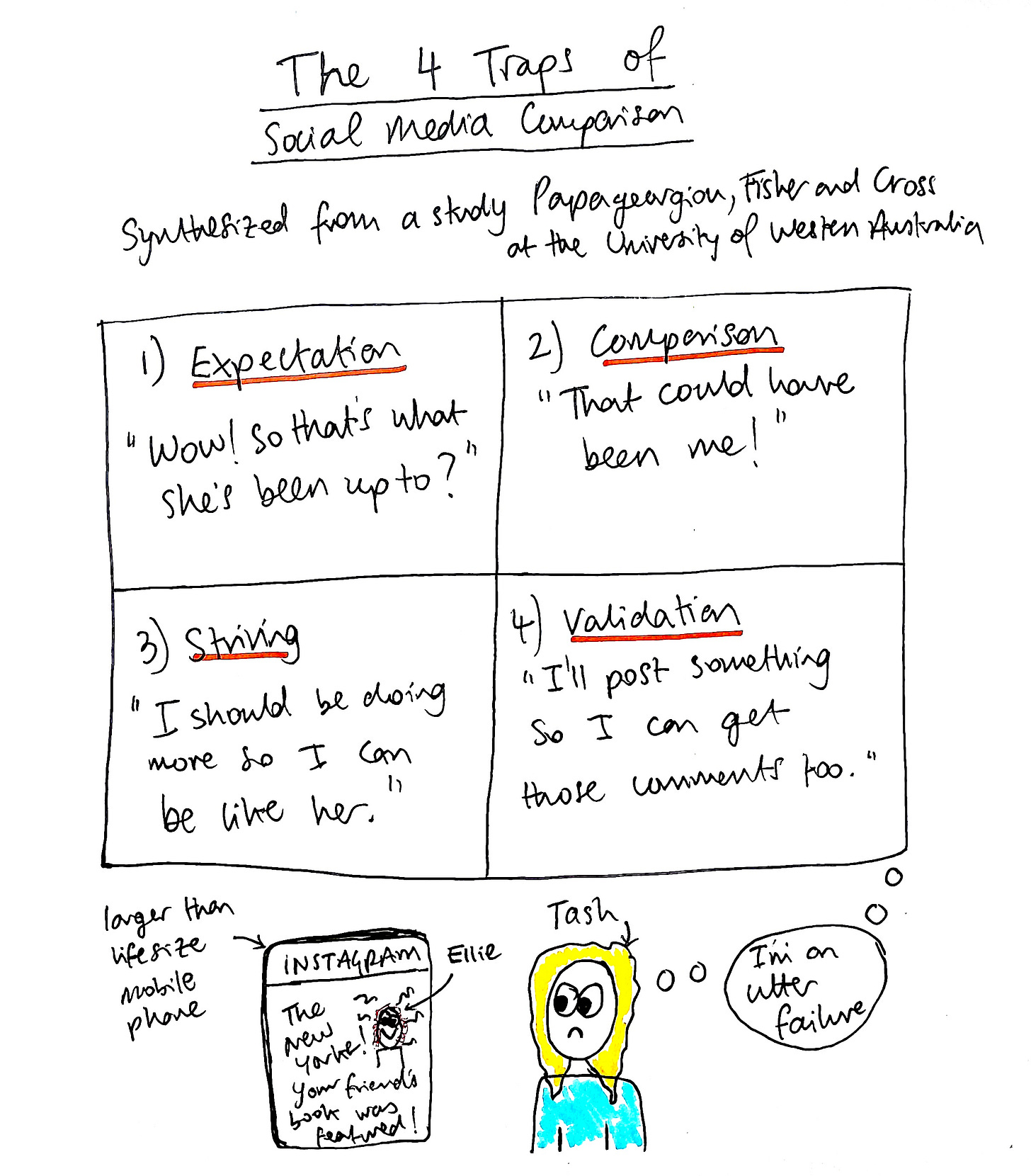What you see on social media can stand in your way of being shamelessly sexy. Here’s what to do about it.
Short Answer ⏰
Comparing yourself to others on social media creates a shame spiral that traps you in four ways: expectation, comparison, striving, and validation1. To counteract this, change your media diet (follow fewer accounts that make you feel terrible, and more accounts that make you feel good), reflect on what exactly you are jealous of in a post so you can take action to make it happen, and consider taking a social media break altogether.
Longer Answer 🍷
Yesterday, a post on Instagram completely derailed me. It was from Ellie (not her real name), whom I grew up with in London, and whose new book is featured in The New Yorker. Ellie’s sweet traditional publishing deal and PR team are propelling her to worldwide success. Plus, she had a smiling picture of her with her family around her book. I don’t have any of that! Within half a second of seeing that Instagram post, I felt like an utter failure, and I was furious.
Preparing this post for The Sex Report, the first study I read was called “Why don’t I look like her?” How adolescent girls view social media and its connection to body image.” In it, researchers in Australia interviewed 24 girls aged 14-17 about how using social media affects their body image. So, what does my book jealousy have to do with Australian teenage girls? Well, we both scroll on social media, a.k.a. the perfect shame spiral recipe for all women everywhere.
And as we know, to be shamelessly sexy, we need to work on our shame. But social media constantly challenges us on this by hitting us with a never-ending conflicting barrage of ideas, images, and representations about who we are supposed to be. And how [insert esteemed societal thing, e.g., pretty, successful] we are supposed to be as well. The researchers casually state that “The potential harms of negative body image is an important public health concern,” because body dissatisfaction, exacerbated by social media, has been linked to low self-esteem, eating disorders, plus our old friends, depression and anxiety. For me, this translates to: no matter in what way we’re comparing ourselves to others, regularly feeling like an utter failure from seeing Instagram posts is bad for us.
Let’s take a deeper look at the four themes the researchers identified for how social media causes us to compare ourselves to others:
The 4 Traps of Social Media Comparison
“Wow, so that’s what she’s been up to?” 😲
Researcher speak: “Expectation”
The researchers thought that seeing over-sexualized images would have the biggest negative impact on girls’ body image, making them believe they were only valued for their appearance (Objectification Theory). But instead, they found that seeing an attractive photo of a peer was more likely to bring up strong feelings of body inadequacy.
Seeing attractive peers hurt the most because it created the “expectation” that a girl had to look a certain way. Actually, seeing photos of attractive celebrities wasn’t as bad either, because the girls believed their attractiveness was less attainable. Researchers also found that the girls' moods and feelings about themselves at the time of scrolling contributed to their negative body perceptions.
This echoed my experience. I don’t care if Michelle Obama is on tour for her umpteenth best-seller, but Ellie getting featured in The New Yorker? That’s where I need to be! Plus, it didn’t help that I’d had an unproductive day and was feeling grumpy and dehydrated when I saw Ellie’s post.
“That could have been me!” 🥺
Researcher speak: “Comparison”
Whether or not the images were sexualized, the girls compared their bodies to the photos on social media in a wholly negative way. Peers who posted photos of themselves were considered confident and empowered by their appearance. It didn’t matter if the participants knew the photo had been edited or was only showing them at their best.
Similarly, it didn’t matter to me that I knew it had taken Ellie five and a half years to write her book; in my mind, I just judged her as “successful”.
“I should be doing more so I can be like her.” 🧗♀️
Researcher speak: “Striving”.
After comparing themselves negatively, the girls shared they were more likely to strive to look a certain way, portray an enviable lifestyle, and get followers, ‘likes’, and comments. This included wanting to change their bodies. They believed they could attain their peers’ bodies by eating less, for example. The researchers noted that following fitness accounts ironically made the girls feel worse about themselves, and they strived to change themselves more.
Seeing these photos of Ellie did make me want to work harder to get a traditional publishing deal, but I’ve just been feeling the deep pain of not having one first. If anything, I feel overwhelmed by how far I have to go to build my indie publishing platform and reach a smidgen of her media features.
“I'll post something like that so I can get those good comments too.” 🫡
Researcher speak: “Validation”
Girls talked about only posting certain types of photos of themselves to gain the currency of approval on Instagram. These photos were mostly based on their appearance, such as a photo of themselves in a bikini.
I might well be tempted to share posts on Instagram to show Ellie and all my friends how I’m thriving in my creative career. Because if other people aren’t there to comment on my successes, did they even happen?
What can we do about this? 🧐
We can try to recognize each of the four traps when we compare ourselves to others on social media.
We can follow accounts that help us build our self-worth, or that celebrate diverse body types. If appearance-based comparison is your thing, look here, here, and here. Unfollow or mute accounts that make you feel bad about yourself. Yes, I am muting Ellie.
We can limit our time on social media. It’s an obvious answer, but I joined ITAA (Internet and Technology Addicts Anonymous) for group support almost three years ago, and it’s been helpful.
A tip from my therapist: dig into where the jealousy is coming from and what exactly you want. The photo of Ellie with her family and her book particularly stung me. Maybe I can seek out more support from my family with the publication of my next book.
Another tip from my therapist: make sure your jealousy doesn’t spill over into envy. The difference between jealousy and envy is that jealousy means you want what the other person has, while envy means you’re willing to destroy that thing so the other person can’t enjoy it.
Though it’s hard, try to approach this with an abundance mindset. If someone you know has obtained this thing, there is room in the universe for you to obtain it also.
When was the last time you felt jealous from a friend’s post on social media? How did you handle it?
Let me know in the comments.
Lots of love,
Tash
💌 ✍️






